REO Speed Wagon
The REO Speed Wagon (alternatively Reo Speedwagon) was a light motor truck manufactured by REO Motor Car Company. It is an ancestor of the pickup truck.
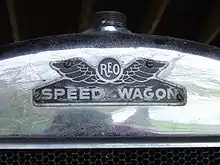

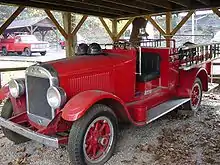
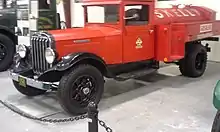
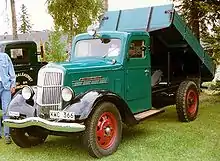
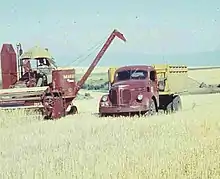
First introduced in 1915, production continued through at least 1953, and made REO (the initials of its founder, Ransom Eli Olds) one of the better-known manufacturers of commercial vehicles in America prior to World War II.[1] Although the basic design and styling of the chassis remained consistent, the Speed Wagon was manufactured in a variety of configurations (pickup and panel truck, passenger bus) to serve as delivery, tow, dump, and fire trucks, as well as hearses and ambulances. Other manufacturers[2] provided refits for adapting the Speed Wagon for specialized purposes.[3][4] The Speed Wagon used REO's "Gold Crown" series of engines, and was well regarded for power, durability, and quality.[5]
While REO produced some wagons based on its automobile chassis (the Model H) starting in 1908 and had organized a division to produce trucks in 1910 with success, the Speed Wagon's introduction in 1915 was a significant step and a sales success. The company was soon offering a variety of Speed Wagon models with many options, and by 1925 had produced 125,000.[6]
After years of roughly equal car and truck emphasis, REO shifted its focus completely to trucks, ending automobile production in 1936. Production for the civilian market was suspended during World War II, resuming in 1946.
The rock and roll quintet REO Speedwagon took its name from this vehicle, which in turn, later adapted into a main character in JoJo's Bizarre Adventure.[7][8]
Models
- 1915 model featured 1-ton weight, four-cylinder engine, three speed transmission and aimed to be faster than the 10-15 mph average speed of contemporary trucks.[9]
- 1917 model featured 3.25-ton weight and canvas top and sides and cost $1125.[10]
- 1925 model featured six-cylinder engine
- 1929 model featured REO's "Gold Crown" 268 cubic inch, 67 horsepower, six-cylinder engine.[3]
- 1933 Model BN [9] featured REO's six-cylinder "Gold Crown" engine and combination of parts from the company's Flying Cloud and Royale luxury cars. It is a rare, relatively fast panel delivery truck with wooden body.
References
- 1935 REO Speed Wagon Bus
- "Standard Body for Reo Chassis". Bus Transportation. 1 (12): 655. December 1922. Retrieved March 22, 2011.
- "1929 REO Speed Wagon Camper". Woodland Family Automobile Collection. Estrella WarBirds Museum. Archived from the original on December 9, 2010. Retrieved March 22, 2011.
- 1915 police patrol wagon "Departments Police History". City of Bloomington, Illinois. Archived from the original on February 29, 2004. Retrieved March 22, 2011.
- Liptrap, Jim. "REO Motor Car Company". Retrieved March 22, 2011.
- Senefsky, Bill (May 2009). "REO Speedwagon - The World's First Pickup". Diesel Power.
- "Review of LADIES AND GENTLEMEN, PLEASE WELCOME…". Film Threat. Retrieved March 23, 2011.
- Verbrugge, Allen; Sowell, Jody (2002). Ladies and Gentlemen, Please Welcome….
- Auto Editors of Consumer Guide. "1933 Reo Speedwagon Model BN". howstuffworks. Retrieved March 22, 2011.
- "REO Speed Wagon (The Vehicle)". Timebinder. Retrieved March 22, 2011.
External links
| Wikimedia Commons has media related to REO Speed Wagon. |
- Reo Speed Wagon Camper on display at Woodland Auto Display, Paso Robles, CA
- montage of light delivery trucks including early model Reo Speed Wagon
- 1924 Speed Wagon print advertisement
- 1925 Speed Wagon print advertisement
- 1928 Reo Speed Wagon print advertisement from Finland emphasizing the advantages of truck engines used in the Speed Wagon over engines from passenger cars.
- 1936 REO Speedwagon print advertisement
- Iowa 80 Trucking Museum